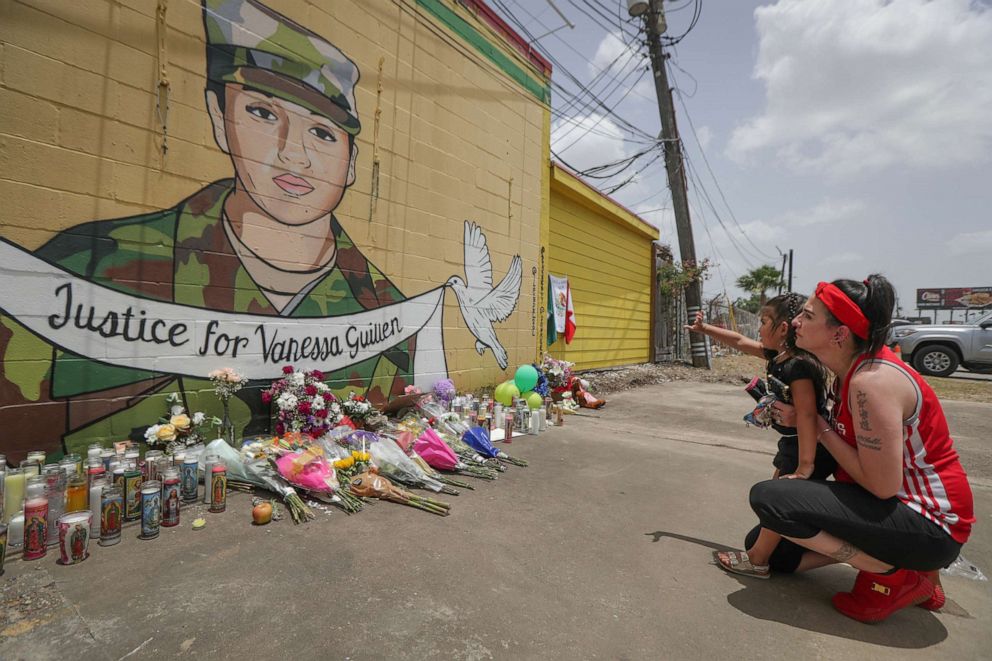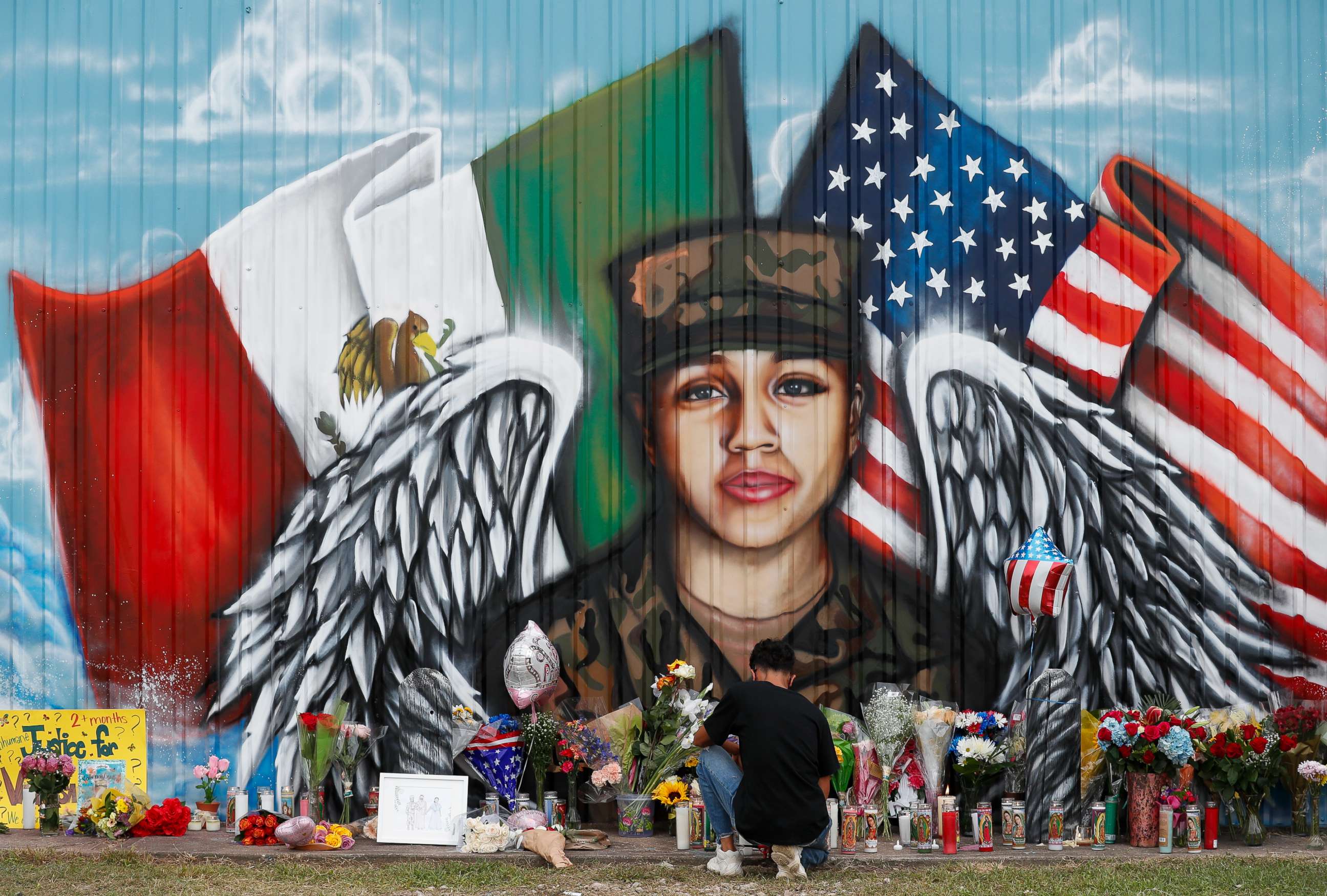Vanessa Guillen's death shines light on military's handling of sex assault and harassment
Guillen's family says she told them she was being harassed by a soldier.
Army soldier Vanessa Guillen’s disappearance and death has sparked outrage across the country and calls for change in Congress.
Her case also raises troubling questions about harassment and sexual assault in the military, and even sparked the social media hashtag #IAmVanessaGuillen, which others have used to share their stories.
The 20-year-old was last seen alive in April at one of the largest Army installations in the country, Fort Hood, in Killeen, Texas.
Army investigators located human remains last week, buried near a river about 20 miles from the base. The Army confirmed this week that the body was indeed Guillen’s. On that same day, a suspect accused of helping to get rid of her body, Cecily Aguilar, appeared in court, where she was charged with one count of conspiracy to tamper with evidence.
Aguilar allegedly told the FBI that her boyfriend, Army Specialist Aaron Robinson, reached out to her after he had killed Guillen. She said she helped him get rid of the body and that the pair went back to where they disposed of Guillen’s remains days after her death to “break them down more,” according to a complaint.
Aguilar led investigators to Robinson. When they confronted him on July 1, he shot and killed himself.
Guillen’s family says she told them she was being sexually harassed by a soldier before her disappearance but didn’t report it. It’s not clear if Robinson was that soldier.

The Army says it’s investigating those claims but says it hasn’t found any evidence that Guillen was sexually harassed.
“How this happened at work, at base, with thousands of people there,” Natalie Khawam, the Guillen family’s attorney, told ABC News. “I think this will haunt everyone forever.”
Vanessa Guillen’s family says the Army didn’t take her disappearance seriously.
“Clearly, they're not capable of anything,” her sister, Lupe Guillen, told ABC News. “Because they didn't get answers. They had two months. Two months. And that's a disgrace.”
The League of United Latin American Citizens (LULAC), a prominent Latino civil rights organization, is now urging Latinos not to join the military until they have answers as to how this could’ve happened to Guillen.
LULAC CEO Sindy Benavides told ABC News it the military took too long to say foul play was involved in Guillen’s disappearance.
“It was really almost two months later when they finally said that there was foul play that was involved. That really made us wonder … if the proper protocols [were] follow[ed],” she said.

Army investigators are trying to figure out the exact nature of the relationship between Guillen and Robinson. For years, the military says it has worked to combat sexual harassment and assault across the services.
A Pentagon survey released last year shows the number of sexual assaults increased in 2018 to 20,500, a result that led Pentagon officials to review and make changes to sexual assault prevention efforts. The Pentagon also reported in 2019 that 1,021 formal sexual harassment complaints had been submitted -- a 10% increase from the previous year.
Benavides says it’s not just Latin women at risk.
“We know that women experience a significant number of harassment, of sexual assault, of rape in the military. We also know that men are targeted, but disproportionately it is women who unfortunately are experiencing this,” she said. “I want to recognize that they are trying to take steps with the SHARP program. And what I do see is the failure in preventative measures…These are more reactive programs.”
The Army’s Sexual Harassment and Assault Response and Prevention Program (SHARP) aims to educate soldiers on the issues surrounding sexual violence and provides a mechanism for how those who experience incidents of sexual assault or harassment can report it to a designated victims advocate.
“We want to make sure that there's an assessment of the SHARP program… but we want to see more aggressive measures to make sure that the military is taking those steps to protect our community,” Benavides said.
Guillen’s case isn’t the first high-profile incident where sexual harassment or assault has been alleged within the military.
Sen. Martha McSally, an Arizona Republican and the first woman in the Air Force to fly in combat, told a Senate hearing room last year that she had been raped by a superior officer.
“I also am a military sexual assault survivor, but unlike so many brave survivors, I didn't report being sexually assaulted,” she said in 2019.

“I blamed myself. I was ashamed and confused. I thought I was strong but felt powerless. The perpetrators abused their position of power in profound ways. In one case, I was preyed upon and raped by a superior officer,” she said. “I almost separated from the Air Force at 18 years of service over my despair. Like many victims, I felt like the system was raping me all over again. I didn’t quit. I decided to stay and continue to serve and fight and lead.”
In January, Army Col. Kathryn Spletstoser filed a federal lawsuit alleging that the vice chairman of the joint chiefs of staff sexually assaulted her multiple times when they worked at U.S. Strategic Command in 2017.
Speltstoser’s allegation had taken center stage at Air Force General John Hyten’s confirmation hearings on Capitol Hill last year. The hearing was delayed pending an investigation, which concluded the allegations were unsubstantiated. McSally even called her a liar.
Speltstoser told ABC News at the hearings that his confirmation would signal that “if you're a senior and general officer who is a popular guy, you will get away with felony sexual assault.”
“But if you are a victim who also has a very distinguished record and no record of lying under any circumstances, you won't be believed … despite the fact that there was no credible evidence that I was lying because I wasn't,” she said. “It basically tells sexual assault survivors, ‘Don't bother to report. You won't be taken seriously, and we'll give your attacker a promotion.’”
Hyten was ultimately confirmed and he continues to deny the allegations.
ABC News also spoke to Air Force Prosecutor and Ret. Col. Don Christensen, who now leads the non-profit Protect Our Defenders, which aims to end sexual misconduct in the military. He said that in the military, the chain of command determines the process when a service member comes forward to report sexual assault or harassment.
“[In the] military, the prosecution decisions are made by command, not prosecutors,” said Christensen. “In the civilian world, if someone was sexually assaulted, they would go to the police and then they would eventually head that case with … a prosecutor. In the military, that decision is [placed] entirely in a commander who often knows the offender. The result of that is a lack [of] faith in the process. And the end result of everything is there are very few prosecutions despite [there being] over 20,000 sexual assaults [that] occur.”
The Army has tried to curb instances of sexual assault and harassment by using tools like the “buddy system.” The initial thought behind it was to pair each service member with an assigned troop to build camaraderie and keep one another accountable. But in recent years, it’s also been used on military installations, informally, as a way to prevent young women from being assaulted on base camps.
In our nation’s capital, calls are growing louder for Congress to act.
Hawaii Rep. Tulsi Gabbard, who also serves as a major in the Army National Guard, has called for an independent investigation into what happened to Guillen.
“Vanessa’s family has suffered throughout her disappearance with no real answers or transparency about what happened to Vanessa and why. Vanessa and her family deserve justice and closure. Our servicemen and women deserve justice and faith that the military they serve in will take care of them,” said Gabbard. “The Department of Defense Inspector General must conduct a full and independent investigation. While we are too late to save Vanessa’s life, we must honor her life by getting to the truth and working to prevent this from happening to others.”
Guillen’s family is asking for the same, and also pushing legislation to protect other service men and women.
“I just want justice. I want that bill to be passed because at the end of the day, we're all human,” Lupe Guillen told ABC News. “At the end of the day, we all deserve to be respected, especially the ones that put their lives at risk every.”




